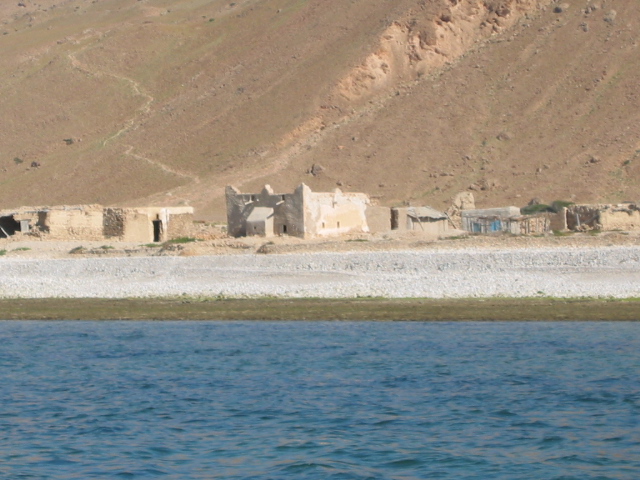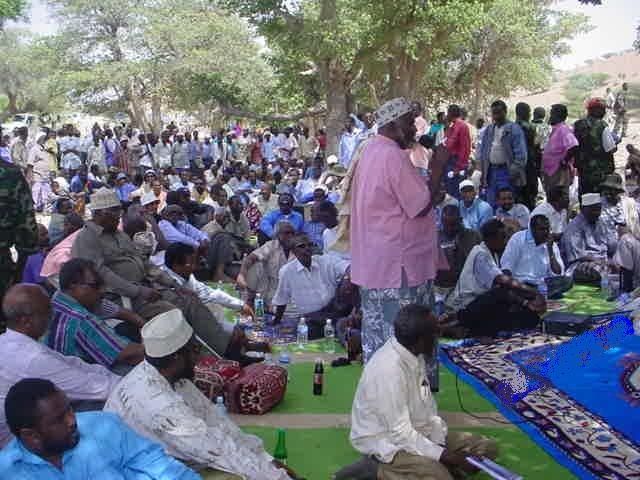| BiyoKulule online Bosaso, Puntland, Somalia |
|
| BiyoKulule online Bosaso, Puntland, Somalia |
|
 Buur-gaaban  Bosaso City  Xaaji Xuseen Gacayte iyo shirkii Nabadaynta Puntland  Sakariya Mohamed
Buur-gaaban |
Much Thunder and Little Rain
According to Parkinson, if there is one
important idea to emerge from the history of political thought, it is “the
idea that the government is to be judged by results.” And a good
government, as Rousseau suggested, is that which improves the quality of
life of its people. Its legitimacy and the people’s sense of identification
with the political order are likely to be enhanced by good performance in
this regard. The present crisis of the state in Africa, or its declining
capacity for stability and development, is related to its failure to satisfy
the needs and aspirations of ordinary people.[1] Looking back from so clear contrasting perspectives, many forms of appraisal are legitimate in Somali political thought. One approach is the approach beloved of clan armed-faction politicians and supporters – exaggeration. It is true that so much has occurred during the last two turbulent decades, in which many different clan-political thinking would be possible. Some clans could trace their history and nation-state political entity to that crafted by the European colonial regimes. Others have approached their geo-political entity by abandoning all forms of colonial drawings and arranged pre-colonial period entities – i.e. traditional ancestral homelands. To examine these competing and often conflicting euphoric and clannish worldviews, we have to assess the high and low points of exaggerations that are endemic in Somali politics. This paper would limit itself to focus on a somewhat different exaggeration, less obvious, but perhaps more revealing approach to the contemporary politics of Puntland Regional State. It might also have some relevance to other new forming regions in southern Somalia (Hiiraanland, Banaadirland, Jubbaland, Southwestland, etc).
Differences in Historical
Perception Those who are “extremists” on one side, of course, believe that the others are kooyte (recent arrivals) or their subjects, as well as the cause of the problem. These groups feel that their clans have been too lenient with the trouble-makers for too long. According to those holding this perception, until the colonial European invasion, almost all of what is now Puntland had always been completely under one ruler. They believe that it is the right time to reclaim that old glory and establish a Regional State under their supervision. As soon as the Kooyte experience that, what do they have as a choice, run to the south and westbound? Given all of the cumulative historical perception of the region, mistrust among its clans, and mutual suspicions, one must wonder if it will ever be possible for Puntlanders to live together in mutual respect, in one Regional State Administration – especially an administration that might participate in sub-clan conflicts. Nevertheless, in 1998, these antagonistic clans gathered and established a regional state called Puntland.
The emergence of a
“bubbling cauldron” State Although it is not an appropriate time for retrospection and appraisal, the revelation of the viability of Regional State in northeastern Somalia seems exaggerated. Zealot Puntlanders pronounce this first decade of Puntland as the “Great Leap Forward”[3], climaxing its founder, Cabdullahi Yusuf, to attain the Presidency of the Federal Somali State. For them, this period underlined Puntlanders’ ability to discover a sure-fire method of political ascendancy and economic development. However, the ascendancy of Cabdullahi Yusuf, in the current Federal Somali State, has involved a maximum of tensions with almost every region in Somalia. There is also some “facts-on-the-ground” that indicate the increasing deterioration of clan-tensions within Puntland itself. Some zealot Puntlanders even argue that those who pushed their hero, Cabdullahi Yusuf, to upstairs into a position in which he would be an “honoured’ President of a Somali Federal State – but without the real power to work his will as he did in Puntland – had ulterior motives.
Factionalism in Puntland The opposition of certain clans, especially among the non-SSDF groups, to the new Regional State is remarkable in a number of ways. Firstly, it is their contention that Puntland, as a political entity, has no benefits to them, and shared no common goals to its ruling sub-clan. They fear that as a marginalized group, they will perpetually remain subservient to the ruling sub-clan. For example, the presidential post, which serves as a yardstick to measure equitable power-sharing, is in the hands of one sub-clan. Aside from the presidential post, the marginalized clans’ resentment to the Administration arose from what they perceived as their political incompatibility with the ruling clan. The “zero-sum” nature of Puntland Administration is such that bestow an opposition little or nothing in terms of top government posts and resource allocation. The current Administration is based on “winner-take-all”; the ruler has absolute power over dispensation of patronage and government resources. It seems that Siyaad Barre’s “zero-sum” game is borrowed by the SSDF veterans. This state of affairs encourages the ruling clan to cling on to power forever; and they presume that they have everything to lose by giving up top government posts including even mayoral and governorship positions. Furthermore, the ruling sub-clan seems get emotionally identified with Puntland, which they consider as their personal property. They believe that their elites should rule Puntland – and if possible, should rule even if the single major phenomenon awaited, the Somali Weyn, is materialized. Not even “ballot-boxes” can dislodge them from Presidential office!!! Due to such defective political system in Puntland, many politicians from opposition clans are in fact swimming against the current – may I say a tragedy of good intentions. Clearly, Puntland, as a building block structure, is not awakening of all clans to self-consciousness; it simply invented sub-clan hegemony where it did not exist before. Also, the drawback to this huge Regional formulation is that marginalized clans is so anxious to show that the new Regional State masquerades under false pretenses that they describe its “electoral systems” as “rigged and fabrication procedures” rather than “transparency and fair”. In this way, these marginalized clans imply that “true” Administration exist that can be advantageously juxtaposed to the current one. Whatever the real motives of Puntland founders were, the belief was widespread among many opposition clans that there had been a SSDF plot. This perspective was encouraged both by the failure of Puntland State to steer its helm by non other than SSDF veterans, and by the advancement of these veterans’ sub-clan members to senior and strategic positions in the army and the administration. The dismissal of prominent figures from other clans (of not SSDF participants) became the norm.
Concluding
Remarks The dilemma that Puntland is facing can be concluded by the expressions of the prominent Kenyan scholar, Ali Mazrui, whose reflection of the hierarchical and authoritarian nature of Somali clans and their strong clan loyalties described as a challenge to navigate between extremes: in the political sphere between tyranny (Somalia under Siyaad Barre) and anarchy (the present Mogadishu situation).[4] Should we say: we are stuck in the stage of much thunder and little rain!
The Roobdoon Forum [1] Georges Nzongola-Ntalaja, Nation-Building and State Building in Africa, (Sapes Books), 1993, pp.19. [2] See Arend Lijphart, 1985, Power-sharing in South Africa, Policy Papers in International Affairs, No. 24. Berkeley: Institute of International Affairs, University of California. Arend Lijphart is professor of political science at the University of California, San Diego. His main field of interest is comparative politics, with an emphasis on ethnically divided societies, democratic institutions, and electoral systems. [3] Referring to the period (1957-1960) when Communist China, under Chairman Mao Zedong, claimed three years of great leap development. [4] Ali Mazrui, “Planned Governance: Economic Liberalization and Political Engineering in Africa,” in African Governance in the 1990s.
|
|